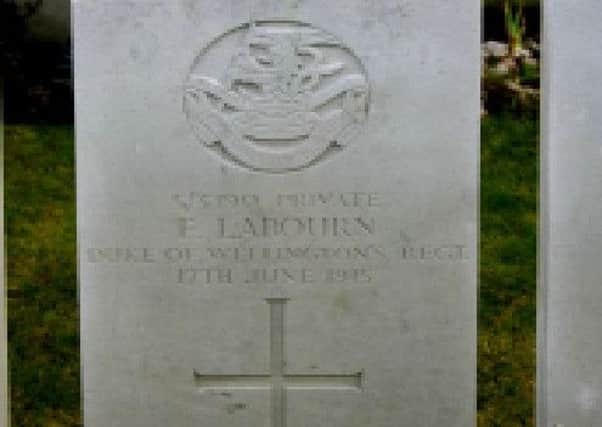WW1 feature: ‘A real man’ who died for his country


Private Fred Labourn, of the Co-op Buildings in Soothill, Batley, passed away after three months on the frontline on June 17, 1915.
He had enlisted at the outbreak of war, joining the 1st/5th Duke of Wellington’s (West Riding Regiment).
Advertisement
Hide AdAdvertisement
Hide AdLieutenant Frank A Sykes initially wrote to Fred’s parents, George and Mary, to inform them of their son’s injury.
“Dear Mrs Labourn, I am sorry to have to tell you that your boy was wounded early yesterday morning. We sent him straight off to hospital and from what I hear he is doing well.
“I always admired your boy; he is one of the pluckiest lads I have on my platoon and I hope to have him back soon. I will try and let you know how he is going on.”
But in a later letter from Lieut Sykes came the news of Fred’s death.
Advertisement
Hide AdAdvertisement
Hide Ad“I regret to have to inform you that your son passed away yesterday.
“He died for his King and Country, which is a thing which will always be remembered of him.
“He had a very peaceful end and passed in his sleep. I feel that I cannot sympathise with you enough because your lad was a ‘real man’ and I am proud to have him in my platoon.”
Born in Chidswell, Dewsbury, Pte Labourn is Remembered with Honour at Merville Communal Cemetery in Nord, France. His name also appears on the Soothill Upper Memorial in St Paul’s churchyard, Hanging Heaton.
Advertisement
Hide AdAdvertisement
Hide AdFred’s older brother Albert enlisted in 1916 and, though wounded in action twice, survived the war and married Agnes Groark in 1921.
He died in 1952 aged 56. Fred also left his other older brother George.
This story was researched by Project Bugle, a Heritage Lottery-funded commemoration group which produce newsletters and exhibitions about Batley and Birstall’s WWI dead.
To see more of their work, visit the town’s libraries.